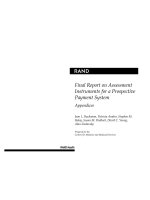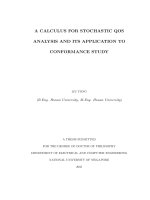final report applied calculus for it
Bạn đang xem bản rút gọn của tài liệu. Xem và tải ngay bản đầy đủ của tài liệu tại đây (1.91 MB, 23 trang )
<span class="text_page_counter">Trang 1</span><div class="page_container" data-page="1">
<b>FACULTY OF INFORMATION TECHNOLOGY</b>
<b>PHAM DANG ANH NGOC- 523H0162</b>
<b> FINAL REPORT</b>
<b>APPLIED CALCULUS FOR IT</b>
<b>HO CHI MINH CITY, JANUARY 2024</b>
</div><span class="text_page_counter">Trang 2</span><div class="page_container" data-page="2"><b>FACULTY OF INFORMATION TECHNOLOGY</b>
<b>PHAM DANG ANH NGOC- 523H0162</b>
<b>FINAL REPORT</b>
<b>APPLIED CALCULUS FOR IT </b>
<b>M.A. Pham Kim Thuy </b>
<b>HO CHI MINH CITY, JANUARY 2024</b>
</div><span class="text_page_counter">Trang 3</span><div class="page_container" data-page="3">I would like to express my sincere gratitude to Ton Duc Thang University,the Faculty of Information Technology, and the Department of AppliedAnalysis, as well as to MA. Pham Kim Thuy, for their efforts in creating the bestlearning conditions for me during this period. This report represents theculmination of the knowledge I have acquired and am currently learning, thanksto the dedicated and passionate teachings of Ms. Pham Kim Thuy. With thisknowledge, I have gained a deep understanding of the subject, broadened myperspectives, and can now apply it in practical situations, laying the foundationfor promising future developments.
<b> Ho Chi Minh City, January 6, 2024. </b>
Author,(Signature and Full Name)
Ngoc Pham Dang Anh Ngoc
</div><span class="text_page_counter">Trang 4</span><div class="page_container" data-page="4"><b>COMPLETED PROJECT AT TON DUC THANG UNIVERSITY</b>
I hereby affirm that this research project is my own work and wasconduct under the scientific guidance of Dr. Pham Kim Thuy. The researchcontent and results presented in this thesis are truthful and have not beenpublish in any form prior to this. The author collected the data in the tables,used for analysis, comments, and evaluations, from various sources, asexplicitly stated in the reference section.
Furthermore, this project incorporates some comments, evaluations, anddata from other authors and different organizations, all of which areappropriately cite and reference.
<b>In the event of any academic dishonesty, I take full responsibility forthe content of my project. Ton Duc Thang University is not implicate in any</b>
copyright violations or infringements that may arise during the course of thisproject.
Ho Chi Minh City, January 6, 2024Author,
(Signature and Full Name))Ngoc
Pham Dang Anh Ngoc
</div><span class="text_page_counter">Trang 5</span><div class="page_container" data-page="5"><b> CONTENTS</b>
<b>LIST OF DRAWINGS...</b>
<b>CHAPTER 1 THEORETICAL FOUNDATIONS...</b>
<b>CHAPTER 2 MAIN CONTENT...</b>
2.2 Solutions...
<b>REFERENCES...</b>
</div><span class="text_page_counter">Trang 6</span><div class="page_container" data-page="6"><b>LIST OF DRAWINGS</b>
Figure 1:Task 4... 9Figure2: Task 6... 12
</div><span class="text_page_counter">Trang 7</span><div class="page_container" data-page="7"><b>CHAPTER 1 THEORETICAL FOUNDATIONS</b>
<b>Task 1:</b>The graphs of even and odd functions have characteristic symmetry properties. A function y=f (x ) is an
f<small>'</small>(a) Is the slope of y=f(x)atx=a.
The tangent line to y=f(x) at (a, f (a)) is the line passing through (a, f (a))with slopef '(a):
</div><span class="text_page_counter">Trang 8</span><div class="page_container" data-page="8">y−f(a)=f '(a)(x−a)
⟺ f(c)≥ f(x) For all x near c (for all x in an open interval containingc)f Has a local (or relative) minimum at c ∈ D
⟺ f(c)≤ f(x) For all x near c (for all x in an open interval containingc)Let f be continuous andca critical number off.
Suppose fis differentiable near c(except possibly atc).If f ' changes from positive to negative at c,Then f has a local maximum atc.
If f ' changes from negative to positive at c,Then f has a local minimum atc.
If f 'does not changes sign at c,Then f has no local max/min atc.
<b>Task 6:</b>
∆ L=
√
(∆ x)<sup>2</sup>+(∆ y)<sup>2</sup>∆ L∆ x<sup>=</sup>
√
1+(
∆ y∆ x)
<small>2</small>dLdx<sup>= lim</sup><small>∆ x→ 0</small>
∆ L∆x<sup>=</sup>
√
1+(
dyIf f ' is continuous on[a,b], then the length (arc length) of the curve y=f (x )from thepoint A=(a,f (a)) to the point B=(b,f(b))is the value of the integral:
</div><span class="text_page_counter">Trang 9</span><div class="page_container" data-page="9">(b<small>n</small>) Be series such that0 ≤a<small>n</small>≤b<small>n</small>For all n (Or for all n≥ N¿ then
<small>n =1∞</small>
(a<sub>n</sub>)diverges ⇒
∑
(a<sub>n</sub>) Be series
Suppose lim
a<small>n</small>
|
=L where 0 ≤ L≤∞If 0 ≤ L<1,then∑
(a<small>n</small>) is convergent
If 1< L≤∞ ,then
∑
(a<sub>n</sub>) is divergent
If L=1 ,the convergenceof
∑
<small>i=0n</small>
</div><span class="text_page_counter">Trang 10</span><div class="page_container" data-page="10"><b>CHAPTER 2 MAIN CONTENT</b>
<b>2.1 Topics</b><b>Task 1:</b>Tell whether the following functions are even, odd, or neither. Give reasonsfor your answer. (1.0 point)
+xf(x)= <sup>4</sup>
−4f(x)= <sup>x</sup>
x→5<small>−¿ ¿</small>
<b>Task 3:</b>Find the derivatives dy
dx<sup> of the following functions: (1.0 point)</sup>y=
√
x−4√
x +4y=(√
xOn what open intervals is f increasing or decreasing?
At what points, if any, doesf assume local maximum and minimum values?
<b>Task 6:</b>Find all curves through a point where x=1 whose arc length is thefollowing L value: (1.0 point)
</div><span class="text_page_counter">Trang 11</span><div class="page_container" data-page="11">The series a<sub>2</sub>+a a<sub>4</sub>+ <sub>8</sub>+a<sub>16</sub>+…+ a<sub>2</sub><small>n</small>+…<sub> diverges</sub>
Determine the convergence or divergence of the following series. Explain indetails.
<b>Task 8:</b>Find all values of x such that the following series is absolutely convergent:(1 point)
<small>n =1∞</small>
n x<small>n</small>
(n+1) (2 x +1)<small>n</small>
<b>Task 9:</b>One thousand earphones sell for $55 each, resulting in a revenue of (1000)($55) = $55,000. For each $5 increase in the price, 20 fewer earphones are sold. Forex., if the price of each earphone is $60, there will be 980 (1000 – 20) earphonessold; if the price of each earphone is $65, there will be 960 (1000 – 20 – 20)earphones sold; so on. Find the revenue in case the price of each earphone is $255(1 point)
</div><span class="text_page_counter">Trang 12</span><div class="page_container" data-page="12">+(− )x¿ <small>2</small>−x
Since f(−x)≠ f (x )and(−x)≠−f (x) , so f (x) is neither even nor odd. f(<sub>x</sub>)=x<small>3</small>
+ x
Domain of function: D=R ⟹ ∀ x ∈ D ,−x ∈ Df(−x)=(−x)<small>3</small>
+(− )x¿−x<small>3</small>−x
¿−(x¿¿3+ x)¿¿−f (x)
So f (x) is odd function f(<sub>x</sub>)= <sup>4</sup>
x<small>4</small>−4Domain of function:x<small>4</small>−4 ≠ 0
−2) (x<small>2</small>+2)≠ 0(x<small>2</small> x+2>0 ∀ )⟹ x<small>2</small>−2≠ 0
⟹ x ≠
√
2, x≠−√
2⟹ D={x ∈ R∨x ≠
√
2, x≠−√
2}⟹ ∀ x ∈ D ,−x ∈ Df(−x)= <sup>4</sup>(− )x<small>4</small>
−4¿ <sup>4</sup>
−4¿f (x)
So f (x) is even function f(<sub>x</sub>)= <sup>x</sup>
−4
</div><span class="text_page_counter">Trang 13</span><div class="page_container" data-page="13">Domain of function:x<small>4</small>−4 ≠ 0
−2) (x<small>2</small>+2)≠ 0(x<small>2</small> x+2>0 ∀ )⟹ x<sup>2</sup>−2≠ 0
⟹ x ≠
√
2, x≠−√
2⟹ D={x ∈ R∨x ≠
√
2, x≠−√
2}⟹ ∀ x ∈ D ,−x ∈ Df(−x)= <sup>(− )</sup><sup>x</sup>(− )x<small>4</small>
−4¿− <sup>x</sup>
−4¿−f (x)
So f (x) is odd function
<b>Task 2: </b>lim 555x<small>2</small>
<small>x →5−555</small><sub>=0</sub><small>−¿¿¿</small>
¿ , lim
</div><span class="text_page_counter">Trang 14</span><div class="page_container" data-page="14"><b>Task 3:</b>
√
x +4y<small>'</small>=(
√
x−4)<small>'</small>(√
x +4)−(√
x−4) (√
x+4)<small>'</small>2
√
x(√
x +4)−(√
x −4) <sup>1</sup>2√
x(√
x +4)<small>2</small>¿(
√
x +4−√
x +4)2√
x(√
x+4)<small>2</small>y '=−10
(√
x10<sup>−1</sup>)
<small>'</small>(√
x10 <sup>−1</sup>)
<small>−11</small></div><span class="text_page_counter">Trang 15</span><div class="page_container" data-page="15">¿ <sup>−10</sup>
⟹ f<sup>'</sup>(0)<sub>=2e</sub><small>0</small>
⟹ f<sup>'</sup>(0)=2
Calculate f (x) at x=0:⟹ f(0)=2 e<small>0</small>
</div><span class="text_page_counter">Trang 16</span><div class="page_container" data-page="16">⟹
[
sin(
x+<sub>4</sub><sup>π</sup>)
=0sin(
x −<sup>π</sup>4
)
=0⟹[
x +<sub>4</sub><sup>π</sup>=kπ(k ∈ Z )x−<sup>π</sup><sub>4</sub>=kπ(k ∈ Z )
⟹
[
x=kπ−<sup>π</sup><sub>4</sub>(k ∈ Z )x=kπ+<sup>π</sup><sub>4</sub>(k ∈ Z )Since the domain is restricted to 0≤ x≤ π2
</div><span class="text_page_counter">Trang 17</span><div class="page_container" data-page="17">⟹
[
x=<sup>3 π</sup>4 <sup>,x=</sup>7 π4x=<sup>π</sup>
4<sup>, x=</sup>5 π
So the critical numbers of f :x ∈
{
π4<sup>,</sup>3 π4 <sup>,</sup>
5 π4 <sup>,</sup>
7 π4
}
Domain of function: D=¿ ¿]3 π4
5 π4
7 π
f (x)f(0)
3 π4
)
f
(
5 π7 π4
)
f(2)
⟹ f(<sub>x</sub>)Is increasing on
(
π4<sup>,</sup>3 π4
)
∪(
5 π4 <sup>,</sup>7 π
⟹ f(x)Is decreasing on
[
0 ,<sup>π</sup>4)
∪(
3 π4 <sup>,</sup>5 π
4
)
∪(
7 π4 <sup>,2</sup>]
f '(x) Change from positive to negative at x=<sup>3 π</sup>4 <sup> and </sup><sup>x=</sup>
7 π4⟹ f(<sub>x</sub>) Has a local maximum at x=<sup>3 π</sup>
4 <sup> and </sup><sup>x=</sup>7 π
4f '(<sub>x</sub>) Change from negative to positive at x=<sup>π</sup><sub>4</sub> and x=<sup>5 π</sup><sub>4</sub>
⟹ f(<sub>x</sub>) Has a local minimum at x=<sup>π</sup>4<sup> and </sup><sup>x=</sup>
5 π4
<b>Task 6:</b>
The arc length of the curve y=f (x ) from x = a to x = b is L=
∫
<sup>b</sup>√
1+(
f<small>'</small>(x))
<small>2</small>dx
</div><span class="text_page_counter">Trang 18</span><div class="page_container" data-page="18">⟹ L=
∫
x<small>2</small>dx Is the arc length from x = 1 to x = 5 of the curve y=f(x)with
As y=f(x)⟹ f<sup>'</sup>(x )=<sup>dy</sup>dx⟹
(
dyx<small>2</small>=±<sup>1</sup>x⟹ dy=±1
x<sup>dx</sup>⟹
∫
dy=±∫
<sup>1</sup> <sub>x</sub>dx⟹ y=± ln|x|+cThe curves through a point where x=1 ⟹ y=0To substitutex=0 into the function y=± ln|x|+c⟹ y=± ln |1|+c
</div><span class="text_page_counter">Trang 19</span><div class="page_container" data-page="19">The series a<small>2</small>+a a a<small>4</small>+ <small>8</small>+ <small>16</small>+…+a<sub>2</sub><small>n</small>+…=
∑
The series a<sub>1</sub>+<sup>a</sup><small>2</small>
(
a<sub>2</sub><small>n</small>2<small>n</small>)
a<sub>2</sub><small>n</small>2<small>n</small>≤ a<sub>2</sub><small>n</small> (a<sub>2</sub><small>n</small>>0<sub>And</sub><sub>n>1</sub><sub>)</sub>The series
∑
<small>n =1∞</small>
a<small>k</small> is non-decreasing ⟹ 2<sup>n</sup><k <2<small>n +1</small>
According to the topic:a<sub>2</sub><small>n</small>≥ a ≥ a<sub>k</sub> <sub>2</sub><small>n+ 1</small>⟹a<small>k</small>
k<sup>≥</sup>a<sub>2</sub><small>n +1</small>2<small>n +1</small>
Sum of digits between 2<small>n</small>and 2<small>n+ 1</small>
<small>2n+ 1</small>a<small>k</small>
<small>2n+ 1</small>a<sub>2</sub><small>n+ 1</small>2<small>n+1</small>
<small>2n+1</small>a<small>k .</small>
k <sup>.(2</sup><sup>¿¿</sup><sup>n)≥</sup>
∑
<small>2n+ 1</small>a<sub>2</sub><small>n+ 1</small>2<small>n+1</small>.(2<small>n</small>
<small>2n+1</small>a<small>k .</small>
k <sup>.(2</sup><sup>¿¿</sup><sup>n)≥</sup>
∑
<small>2n+ 1</small>a<sub>2</sub><small>n+ 1</small>
2 <sup>.</sup><sup>¿</sup>a<sub>2</sub><small>n +1</small>Is an element of the.
∑
a<sub>2</sub><small>n</small> (divergent series)
<small>2n+1</small>a<sub>2</sub><small>n +1</small>
2<small>n+1</small>. Isdivergent series
Apply the Comparison Test to the series:a<small>k .</small>
k <sup>></sup>a<sub>2</sub><small>n+ 1</small>2<small>n+1</small>
<small>2n+ 1</small>a<sub>2</sub><small>n+ 1</small>
2<small>n+1</small>. Is divergent series⟹
∑
<sup>2</sup><small>n+ 1</small>a<small>k .</small>
k <sup>.Is divergent series</sup>
</div><span class="text_page_counter">Trang 20</span><div class="page_container" data-page="20">The additional terms a<sub>k .</sub>
n<sup>+… Is divergent series</sup>
<b>Task 8:</b>
<small>n =1∞</small>
n
|
<small>n → ∞</small>
|
n<small>2</small>+2 n+1n<small>2</small>
+2 nx(2 x+1)
|
+2 n
)
x(2 x+1)|
⟹ L¿
|
(1+0) <sup>x</sup>(2 x +1)|
=|
x</div><span class="text_page_counter">Trang 21</span><div class="page_container" data-page="21">⟹
{
x(2 x+1)<sup>−1<0</sup>x(2 x+1)<sup>+1>0</sup>
⟹
{
x−2 x−12 x+1 <sup><0</sup>x +2 x+12 x+1 <sup>>0</sup>
⟹
{
−x−12 x +1<sup><0</sup>3 x +12 x +1<sup>>0</sup>When−x−1
Domain of function: D=
{
x ∈ R∨x ≠<sup>−1</sup>2}
3 x +1
2 x +1<sup>=0 ⇔ 3 x +1=0⇔ x=</sup>−1
3 x +1
</div><span class="text_page_counter">Trang 22</span><div class="page_container" data-page="22">⟹ x ∈
(
−∞,−<sup>1</sup>2)
∪(
−1Since ⟨1⟩and ⟨2⟩
⟹
{ [x ←1x><sup>−1</sup>2
⟹
[
x←1x ><sup>−1</sup>3</div><span class="text_page_counter">Trang 23</span><div class="page_container" data-page="23">[1]. Weir, M. D., Hass, J., & Thomas, G. B. [2010]. Thomas' Calculus: EarlyTranscendentals (13th ed.). Pearson Education, Boston..
</div>








